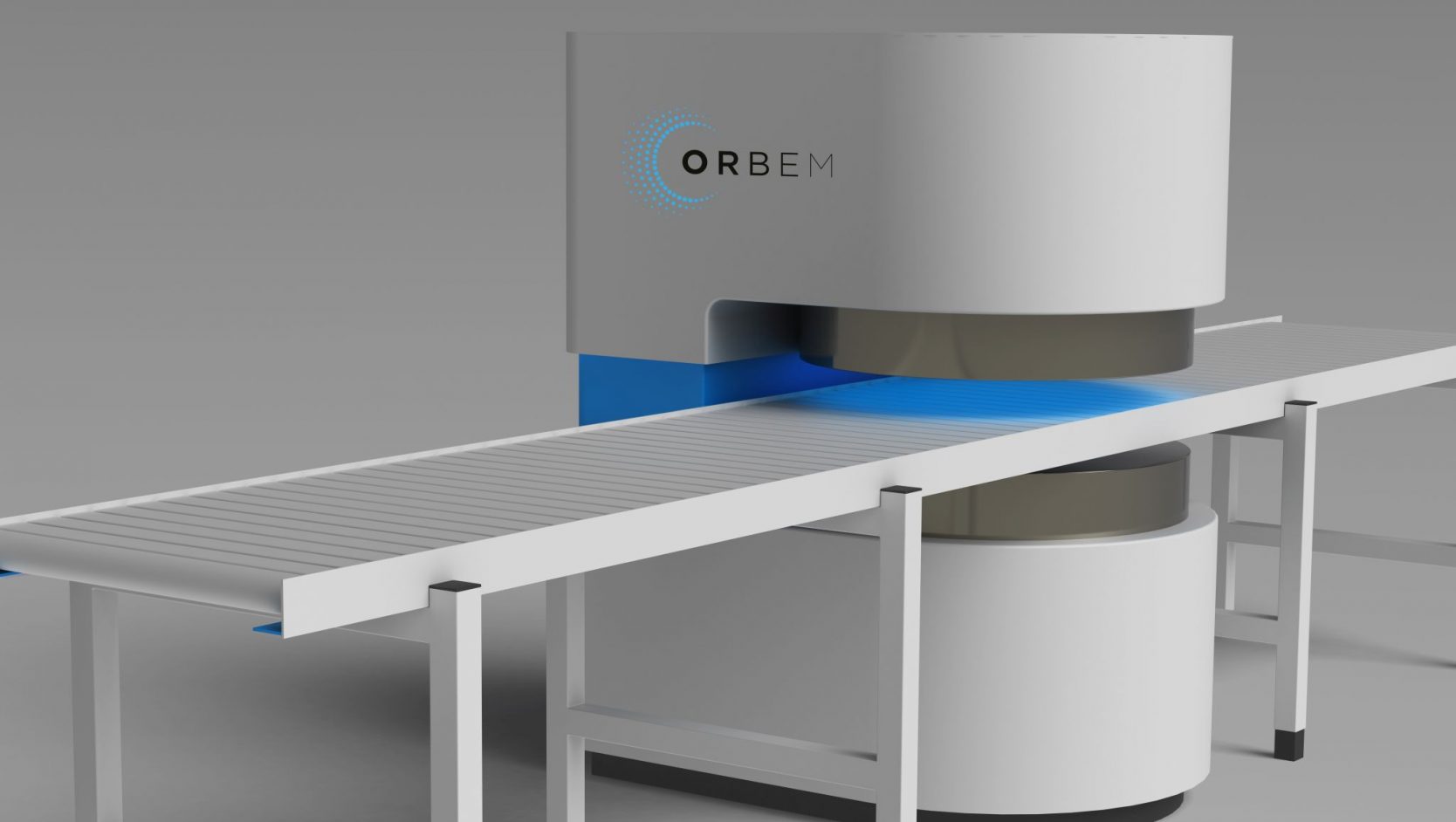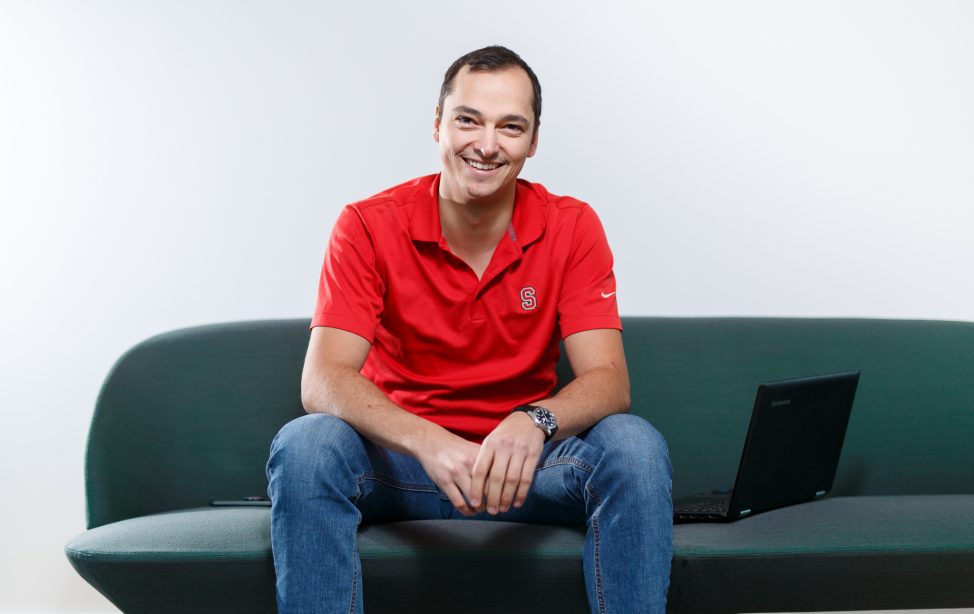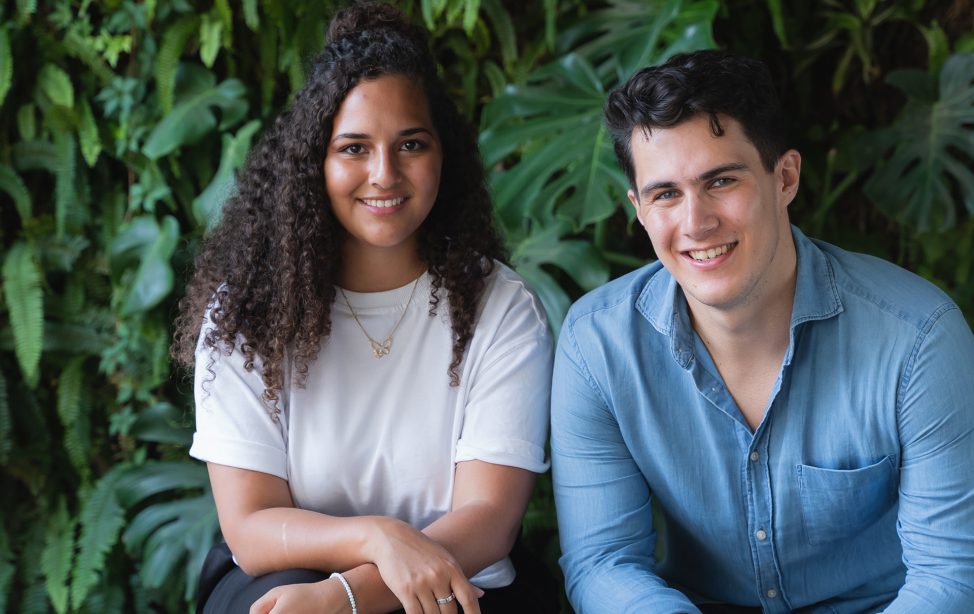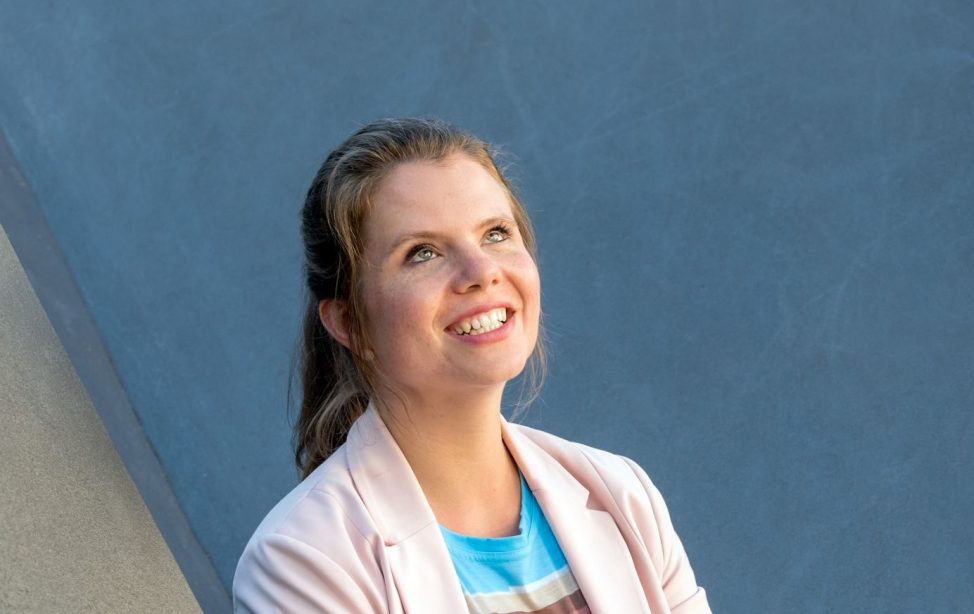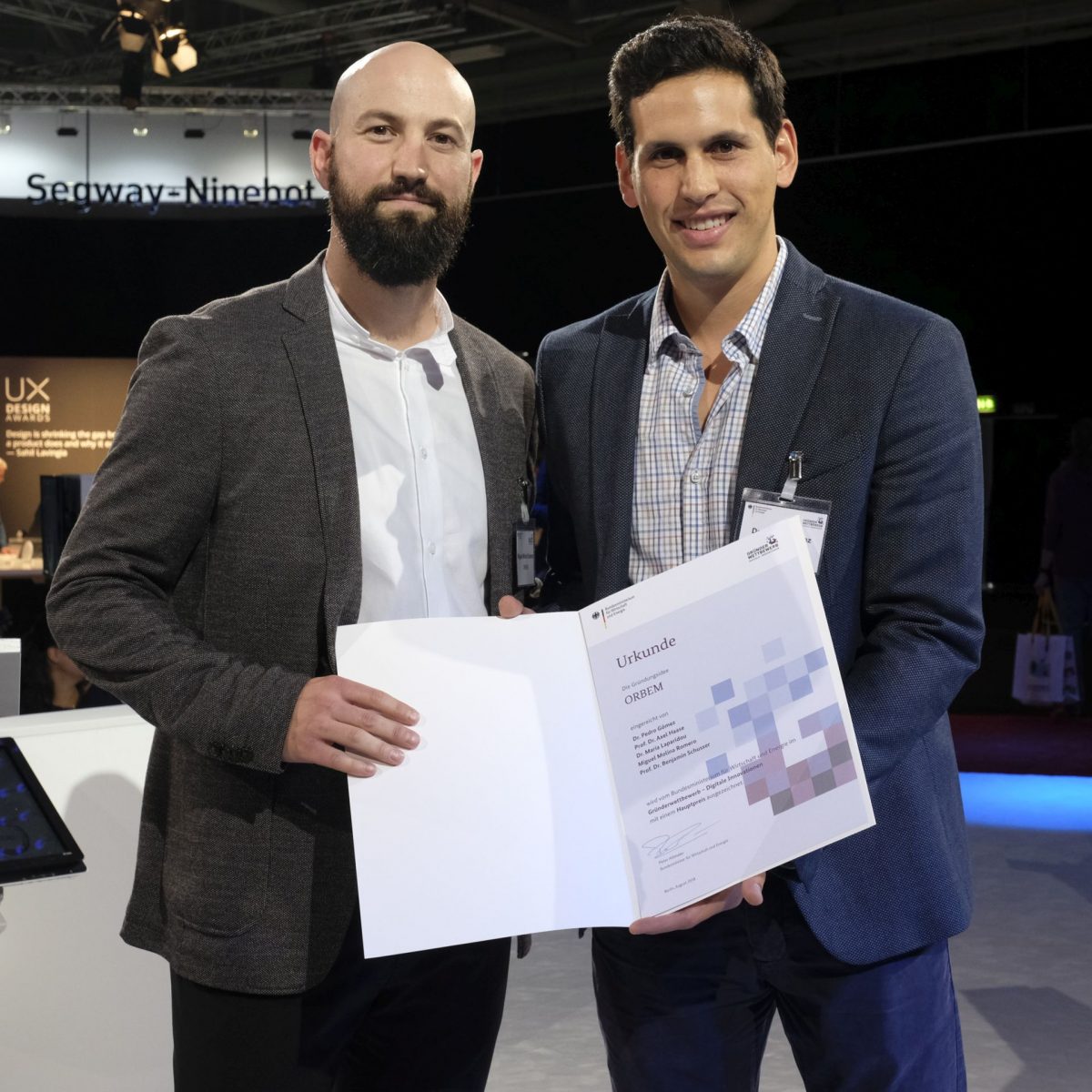
Even before launching their start-up, TUM Alumni Dr. Miguel Molina Romero and Dr. Pedro Gómez have won top prizes in national and international competitions. At the Start-up Competition – Digital Innovations organized by the Federal Ministry for Economic Affairs and Energy, they won the first prize (Picture: Start-up Competition – Digital Innovations)
Gründer Miguel Molina Romero und Pedro Gómez
Pedro Gómez and Miguel Molina Romero quickly realized how much their objectives and passions aligned. “We are driven by big challenges,” they emphasize. “When we are presented with a difficult problem whose solution holds the promise of enormous positive impacts on society and the environment, we are all in.” Their goal was to couple MRI imaging with AI-powered image analysis and to unlock new uses outside the medical arena.
SUSTAINABILITY ON VARIOUS LEVELS
What began in 2017 as a research project at TUM under the name Orbem is now a highly regarded and multi-award-winning high-tech start-up. Developed by Pedro Gómez and Miguel Molina Romero in cooperation with Reproductive Biotechnology specialist Maria Laparidou, the AI-driven imaging technology enables contactless examination and classification of objects. The prototype Genus is much cheaper, faster and more versatile than conventional MRI methods. It can be used, for example, in the poultry industry or in the agricultural industry.
By using the scanner, the poultry industry is able to determine whether eggs have been fertilized or not. As a result, billions of unfertilized eggs do not end up in the trash, but on the breakfast table. Thus, egg production can sustainably be increased. The founders are focusing in particular on countries where it has not been possible to produce enough eggs to feed the population.
TUM provides us not only with the knowledge we needed to set up our own business, but above all with an entrepreneurial spirit.
SAVING THE WORLD WITH PERSEVERENCE
Pedro Gómez and Miguel Molina Romero’s actions are characterized not only by great conviction for their cause, but also by profound perseverance, which TUM has instilled in them. “Science is a continuous search for questions and answers in an environment of high uncertainty. Starting a high-tech company is not that different,” they explain. “In numerous courses on entrepreneurship, public speaking and other soft skills, TUM prepared us for this environment and taught us to be persistent.”
The young entrepreneurs are also particularly grateful to TUM for the wide range of specific support they received when launching their start-up. They consider TUM ForTe – TUM Office for Research and Innovation and the TUM Start-up Consulting as crucial in the fact that they were able to obtain a seven-digit grant through the EXIST – Business Start-Up Grant of the Federal Ministry for Economic Affairs and Energy. “TUM provided us not only with the knowledge we needed to set up our own business, but above all with an entrepreneurial spirit,” Pedro Gómez and Miguel Molina Romero state. ” Without TUM, there would be no Orbem.”
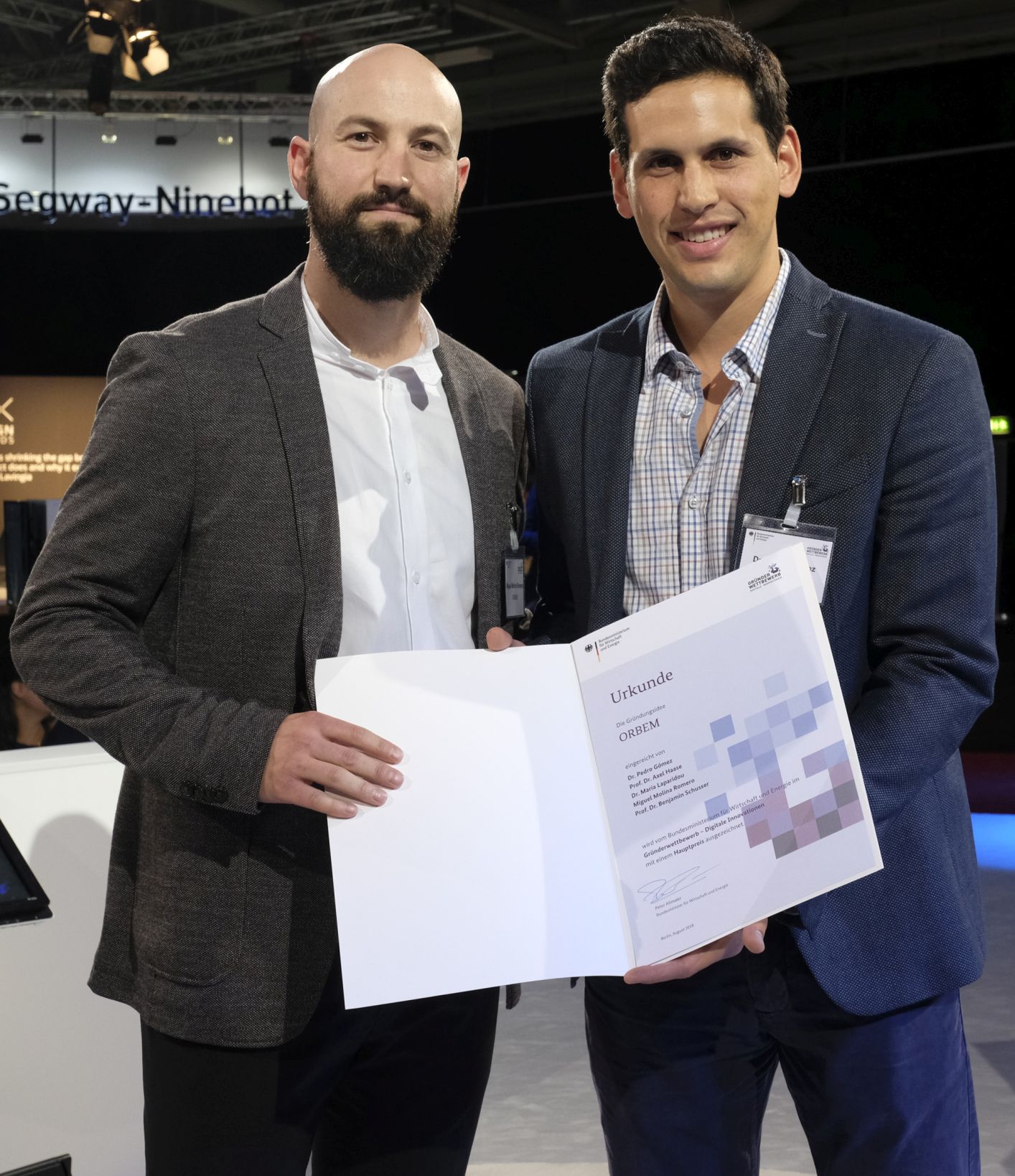
Miguel Molina Romero (l.) and Pedro Gómez (Picture: Start-up Competition – Digital Innovation).
Miguel Molina Romero und Pedro Gómez
Doctorate Informatics 2017 and Master Biomedical Computing 2014, Doctorate Informatics 2017
Miguel Molina Romero started coding at the age of sixteen. In 2009, he left the Universidad Carlos III de Madrid in Spain as an information and communications engineer. In 2012, he graduated from the Universidad Politécnica de Madrid with a master’s degree in Telemedicine and Bioengineering. For five years, he successfully worked as a software engineer at a listed Spanish telecommunications company. However, his desire to explore new things drove him to quit his stable job and pursue a doctorate in Informatics at TUM. He would have never imagined that he would set up a start-up in Germany.
Pedro Gómez graduated from the Instituto Tecnológico y de Estudios Superiores in Monterrey, Mexico, in 2012 with a bachelor’s degree in Biomedical/Medical Engineering. With a DAAD-Conacyt Scholarship from the Mexican National Council for Science and Technology, he came to TUM in Munich in 2013 and completed a master’s degree in Biomedical Computing. In 2017, he added a doctorate in Accelerated MR Imaging at the Chair for Computer Aided Medical Procedures & Augmented Reality.
Together with Maria Laparidou, an expert in Avian Embryology in Reproductive Biotechnology from Ludwig-Maximilians-Universität München, Miguel Molina Romero and Pedro Gómez set up the TUM spin-off Orbem in 2019. Since then, the young company has been unstoppable. With their AI-driven MRI technology, the young visionaries intend to make their contribution to a sustainable future.
In December 2024, the founding team of Orbem was awarded the honorary title of TUM Entrepreneurs of Excellence by the President of TUM.
